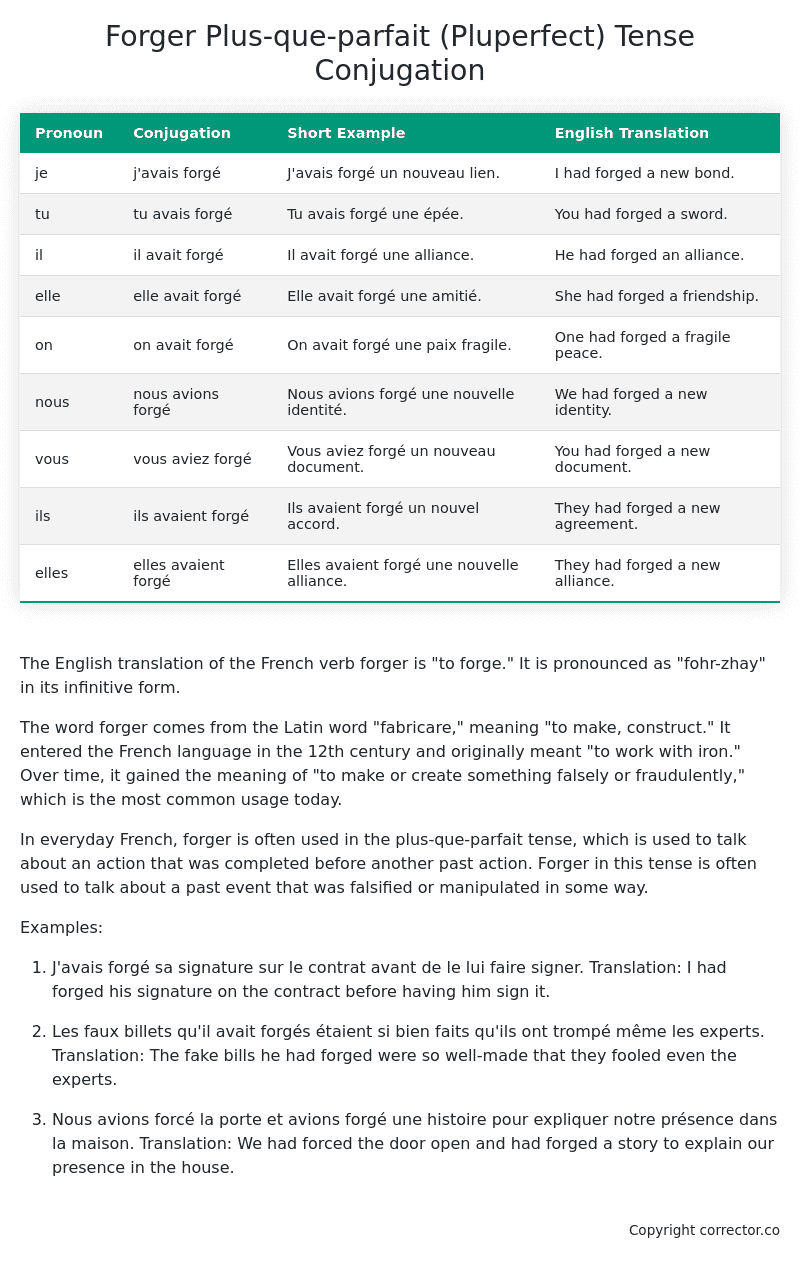Plus-que-parfait (Pluperfect) Tense Conjugation of the French Verb forger
Introduction to the verb forger
The English translation of the French verb forger is “to forge.” It is pronounced as “fohr-zhay” in its infinitive form.
The word forger comes from the Latin word “fabricare,” meaning “to make, construct.” It entered the French language in the 12th century and originally meant “to work with iron.” Over time, it gained the meaning of “to make or create something falsely or fraudulently,” which is the most common usage today.
In everyday French, forger is often used in the plus-que-parfait tense, which is used to talk about an action that was completed before another past action. Forger in this tense is often used to talk about a past event that was falsified or manipulated in some way.
Examples:
-
J’avais forgé sa signature sur le contrat avant de le lui faire signer.
Translation: I had forged his signature on the contract before having him sign it. -
Les faux billets qu’il avait forgés étaient si bien faits qu’ils ont trompé même les experts.
Translation: The fake bills he had forged were so well-made that they fooled even the experts. -
Nous avions forcé la porte et avions forgé une histoire pour expliquer notre présence dans la maison.
Translation: We had forced the door open and had forged a story to explain our presence in the house.
Table of the Plus-que-parfait (Pluperfect) Tense Conjugation of forger
| Pronoun | Conjugation | Short Example | English Translation |
|---|---|---|---|
| je | j’avais forgé | J’avais forgé un nouveau lien. | I had forged a new bond. |
| tu | tu avais forgé | Tu avais forgé une épée. | You had forged a sword. |
| il | il avait forgé | Il avait forgé une alliance. | He had forged an alliance. |
| elle | elle avait forgé | Elle avait forgé une amitié. | She had forged a friendship. |
| on | on avait forgé | On avait forgé une paix fragile. | One had forged a fragile peace. |
| nous | nous avions forgé | Nous avions forgé une nouvelle identité. | We had forged a new identity. |
| vous | vous aviez forgé | Vous aviez forgé un nouveau document. | You had forged a new document. |
| ils | ils avaient forgé | Ils avaient forgé un nouvel accord. | They had forged a new agreement. |
| elles | elles avaient forgé | Elles avaient forgé une nouvelle alliance. | They had forged a new alliance. |
Other Conjugations for Forger.
Le Present (Present Tense) Conjugation of the French Verb forger
Imparfait (Imperfect) Tense Conjugation of the French Verb forger
Passé Simple (Simple Past) Tense Conjugation of the French Verb forger
Passé Composé (Present Perfect) Tense Conjugation of the French Verb forger
Futur Simple (Simple Future) Tense Conjugation of the French Verb forger
Futur Proche (Near Future) Tense Conjugation of the French Verb forger
Plus-que-parfait (Pluperfect) Tense Conjugation of the French Verb forger (this article)
Passé Antérieur (Past Anterior) Tense Conjugation of the French Verb forger
Futur Antérieur (Future Anterior) Tense Conjugation of the French Verb forger
Subjonctif Présent (Subjunctive Present) Tense Conjugation of the French Verb forger
Subjonctif Passé (Subjunctive Past) Tense Conjugation of the French Verb forger
Subjonctif Imparfait (Subjunctive Imperfect) Tense Conjugation of the French Verb forger
Subjonctif Plus-que-parfait (Subjunctive Pluperfect) Tense Conjugation of the French Verb forger
Conditionnel Présent (Conditional Present) Tense Conjugation of the French Verb forger
Conditionnel Passé (Conditional Past) Tense Conjugation of the French Verb forger
L’impératif Présent (Imperative Present) Tense Conjugation of the French Verb forger
L’infinitif Présent (Infinitive Present) Tense Conjugation of the French Verb forger
Struggling with French verbs or the language in general? Why not use our free French Grammar Checker – no registration required!
Get a FREE Download Study Sheet of this Conjugation 🔥
Simply right click the image below, click “save image” and get your free reference for the forger Plus-que-parfait tense conjugation!

Forger – About the French Plus-que-parfait (Pluperfect) Tense
Tense Formation
Common everyday usage patterns
Sequencing of past events
Background information
Hypothetical or reported speech
Interactions with other tenses
Summary
I hope you enjoyed this article on the verb forger. Still in a learning mood? Check out another TOTALLY random French verb conjugation!


